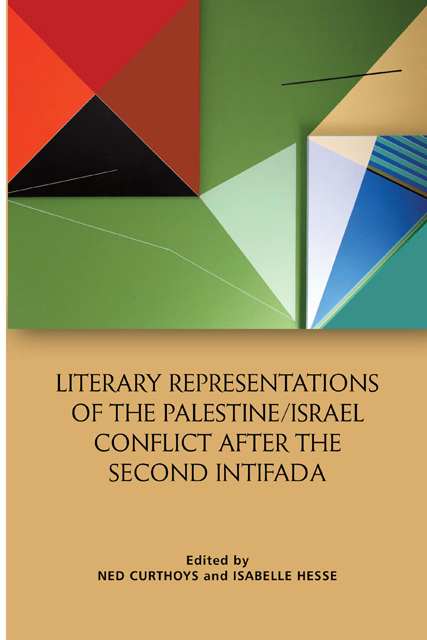Introduction
Published online by Cambridge University Press: 07 June 2023
Summary
In his 1999 multi-modal work, After the Last Sky: Palestinian Lives, Edward Said argued that ‘[p]articularly in fiction, the struggle to achieve form expresses the writer’s efforts to construct a coherent scene, a narrative that might overcome the almost metaphysical impossibility of representing the present’ (Said and Mohr 38). Said emphasises the capacity of literary form, which is often neglected at the expense of historical and political analysis, to represent an increasingly complicated present. Considerations of form permeate After the Last Sky, which combines narrative text with haunting photographs taken by Jean Mohr of Palestinians engaged in their everyday lives in familiar yet culturally significant settings. Literary Representations of the Palestine/Israel Conflict After the Second Intifada reprises Said’s notion of form and the struggle to understand and represent an often mystified present, from a post-Second-Intifada perspective (2000–5 and its aftermath). Our cover image, Palestinian artist Hazem Harb’s Al Baseera #1, exemplifies these ideas. While presenting an abstract image that needs deciphering and demystifying, Harb’s work was inspired by the Arabic word ‘Bazaar’, which can be interpreted both as seeing and seeing through something (Google Arts and Culture). Hence, this image not only emphasises the importance of looking at and seeing the world from different perspectives but acknowledges how representation plays with and challenges our perceptions, which is also at the heart of our edited collection.
We take the onset of the Second Palestinian Intifada (2000–5) as a starting point for our examination of literary representations, as it marked a significant and material experiential change for both Palestinians and Israelis.
For Palestinians, this era constituted an important moment of (sometimes armed) resistance against Israel as an occupying power, the subjection to more intensive military control and surveillance through the proliferation of checkpoints, somatic vulnerability exacerbated by the use of drones, and the endurance of destructive military bombardment in Gaza after the Israeli withdrawal. For Palestinians, the Second Intifada also produced intense debate over strategies of resistance (violent nationalist struggle versus civil rights and BDS – Boycott, Divestment, Sanction – campaigns). For Israeli Jews, the new millennium marked a pronounced surge in Palestinian attacks, especially on civilians, which led to an increased sense of vulnerability and a desire for security during and after the Second Intifada.
- Type
- Chapter
- Information
- Publisher: Edinburgh University PressPrint publication year: 2022



